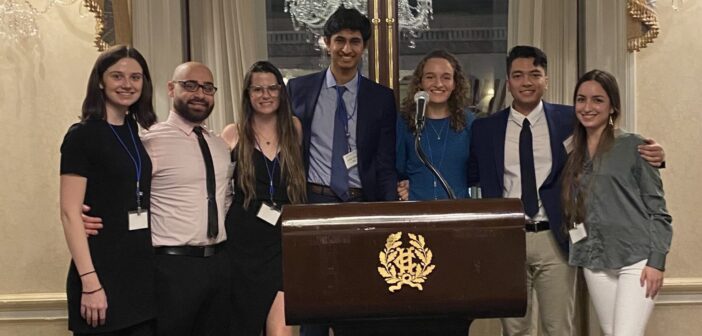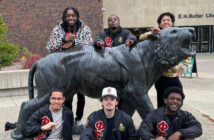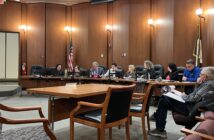A group of students from Lehigh’s Martindale Student Associates Honors Program completed and presented their journal of research to the Consul and Deputy Consul Generals of Argentina at its consulate in New York City on Nov. 18.
Each year, the program allows 12 students to travel to a chosen destination abroad and write a paper on a topic related to that location. The papers are eventually published in the Martindale Center for the Study of Private Enterprise’s annual journal, Perspectives of Business and Economics.
Due to COVID-19, the 2020 Argentina cohort of Martindale students had to conduct their research virtually, and were the first in the program to publish their work on a country without ever stepping foot there. Students researched a variety of topics such as food insecurity, infant healthcare and the soybean industry.
When the pandemic emerged in the spring of 2020, Todd Watkins, executive director of the Martindale Center and professor of economics, was in Argentina. He never got the opportunity to return with that year’s cohort of students.
He said a lot of planning for the trip had already begun at that point.
“We had identified lots of individuals in places that we wanted to visit and talk to in Argentina, however, for obvious reasons we had to meet with them on Zoom,” Watkins said.
Noah Jalango, ‘21, a member of the Argentina Martindale cohort, said the biggest downside of the pandemic was not being able to travel to Argentina.
“Typically we would go visit Argentina before we actually write our papers and have the ability to ask community members questions and visit relevant locations,” Jalango said. “Not having the ability to do this was a little upsetting because we had to conduct most of our research through Google and contacts in the program.”
Despite challenges faced, the collection of students’ works was published and includes research from a wide variety of disciplines.
“Students follow their own instincts in their own interest,” Watkins said. “Sometimes they choose topics that are directly within their major, but many times they do not. We have engineers writing on social issues. We have social scientists, economists writing on technology or infrastructure issues or entrepreneurship issues.”
Jalango’s work focuses on the creation of media conglomerates and monopolies in Argentina. As a journalism major at Lehigh, Jalango was interested in finding a way to implement media and journalism into his work.
He said there was a point in Argentina’s history where it was ruled by a military junta, referring to the period from 1976 to 1983 where the military staged a coup and seized power. During that time some newspaper outlets would report on the atrocities that were happening under the dictator.
“I looked at this past in order to see how the different news outlets kind of grew in size and took over and bought out other smaller companies to get to the kind of massive point where they are today,” Jalango said.
Another member of the cohort, Kira Stevenson, ‘21, focused her research on food insecurity in Argentina.
Stevenson said after taking an economics class related to child hunger and GDP she became interested in looking at these issues through an Argentinian lens to see if malnutrition rates had an effect on its growth as a country.
“Argentina is one of the biggest exporters of food, yet they have one of the highest malnutrition rates in Latin America,” Stevenson said. “So, I wanted to focus on why that is and the juxtaposition between being known for their produce, but then also having a hunger problem.”
Once the journal was completed and published, it was presented at the event in New York City. Watkins said occasionally, student work will get cited online by others, which he said is “fun” to see happen.
“I think the publication of this journal is a huge accomplishment for students,” Watkins said.






Comment policy
Comments posted to The Brown and White website are reviewed by a moderator before being approved. Incendiary speech or harassing language, including comments targeted at individuals, may be deemed unacceptable and not published. Spam and other soliciting will also be declined.
The Brown and White also reserves the right to not publish entirely anonymous comments.